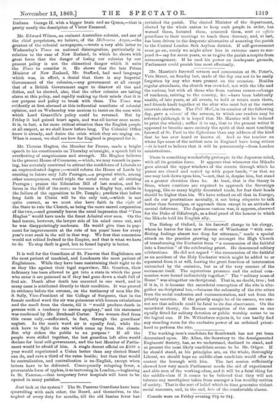It is well for the Guardians of St. Pancras that
Englishmen are the most patient of mankind, and Londoners the most patient of Englishmen. While they have been maintaining their right to do as they like against their legal supervisor, Mr. Goschen, their infirmary has been allowed to get into a state in which the poor who enter it are poisoned as if they had gone down a shaft full of foul air. Death after death has occurred in one ward, and in many cases is attributed directly to their condition. It was proved in evidence before the coroner, on the testimony of men like Dr. S. Solly, Vice-President of the College of Surgeons, that in the female medical ward the air was poisonous with human exhalations and the smell from the closets, till it "would produce death in persons with a tendency to serous apoplexy," and his statement was confirmed by Mr. Brudenell Carter. Two women died from this cause only,—suffocated, in fact, through the guardians' neglect. In the men's ward air is equally foul, while the sick have to fight the rats which come up from the closets. But why sicken the public to no purpose ? If all the people were stifled together, the last guardian left alive would declare for local self-government, and the last Member of Parlia- ment would be afraid of him. A single decent official on £500 a year would superintend a Union better than any elected Board can do, and save a third of the rates beside; but then that would be centralization, and centralization is un-English, except when letters have to be delivered. Consequently relapsing fever, a preventable form of typhus, is so increasing in London,—beginning in St. Pancras,—that temporary fever hospitals will have to be opened in many parishes.


































 Previous page
Previous page